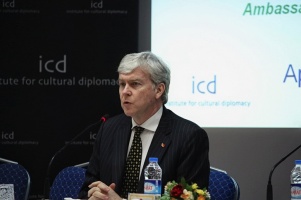Difference between revisions of "H.E. Amb. John Holmes"
Przyvylska (talk | contribs) (Created page with "Cultural Diplomacy in Conflict Prevention By H.E. Amb. John Holmes (Ambassador of Canada to Turkey) 400x200px|thumbnail|left Cultural Diplomacy can play ...") |
|||
| Line 1: | Line 1: | ||
| − | Cultural Diplomacy in Conflict Prevention | + | [[Cultural Diplomacy]] in Conflict Prevention |
By H.E. Amb. John Holmes (Ambassador of Canada to Turkey) | By H.E. Amb. John Holmes (Ambassador of Canada to Turkey) | ||
Latest revision as of 14:37, 1 April 2014
Cultural Diplomacy in Conflict Prevention By H.E. Amb. John Holmes (Ambassador of Canada to Turkey)
Cultural Diplomacy can play a number of roles; I see it mostly in terms of conflict prevention. I think often when you have interstate conflict, it can happen as a result of lack of understanding- prejudices that have existed for many years- and if you don’t have a situation where there is dialogue- where there is an understanding between different groups as to what the problems are, how can we dialogue to solve the problems, how our people can work to prevent an escalation of this situation- then there are real risks of a violent conflict breaking out.
Once you have a situation as we have in Syria where there is an active conflict; I’m not saying that Cultural Diplomacy can’t and shouldn’t have a factor, but you need a truce: it’s very difficult for Cultural Diplomacy to work in a conflict situation. I think you can take a broad definition of Cultural Diplomacy- in my statement I talked about the importance of mediation, and I think understanding not only the political context and the economic context, but also understanding the social and cultural context, is vital to eventually solving an issue such as in Syria. Understanding what drives people on both sides of the issue is very important for anyone playing a mediation role.
- The Ankara Conference on Peace-building & Reconciliation; Ankara, Turkey, April 2012
